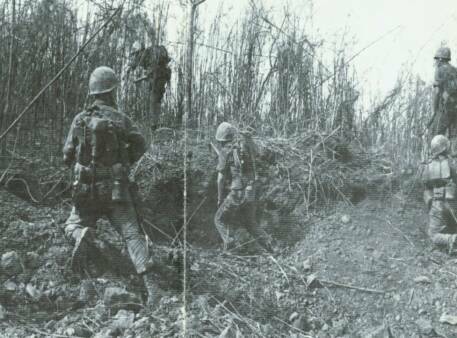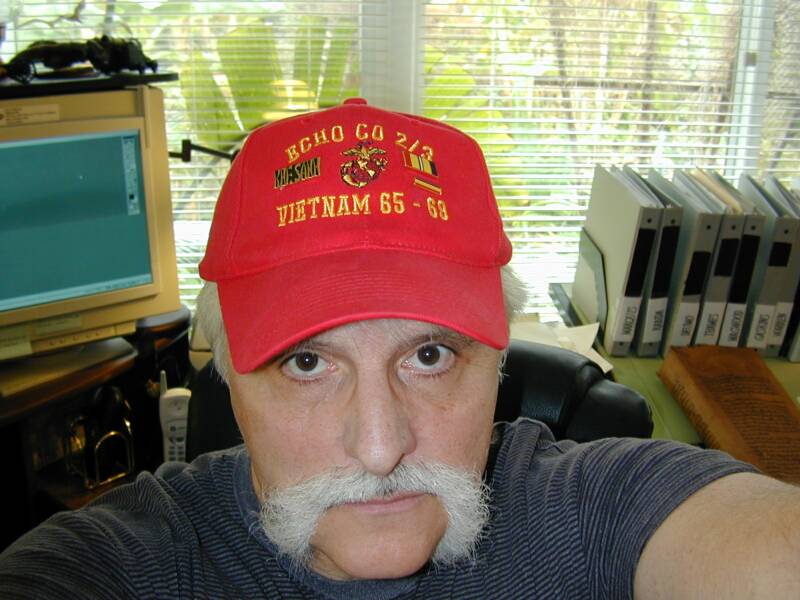Late the following morning, 29 April, M 3/9 and M 3/3 moved out across our front along a small ridgeline from east to west. As they did so, they began to come under sniper fire from the well-concealed bunkers mentioned in the preceding paragraph. In the ensuing firefight, the unit engaged took about nine casualties before air strikes with napalm could be brought to bear on the enemy bunkers. These units were moving toward their intermediate objectives in preparation of an attack on Hill 881 South.
After fine-tuning our defensive posture for the night, Echo Company officers were summoned to the company command post (CP) for a briefing. During that briefing, we were told that elements of the 3rd and 9th Marines were moving to an intermediate objective to our west-northwest to continue the attack on Hill 881 South the morning of 30 April. We were told that literally hundreds of North Vietnamese had been spotted in the open on 881 South and that artillery bombardment would prevail on the hill most of the night. It did. Artillery rained down on Hill 881 South so heavily and for so long, we thought that nothing could have survived it and that the next day would be a piece of cake for the attacking unit or units. Not so, as we could later attest.
The next morning, on 30 April, Echo Company jumped off into the attack. Out mission was to seize the big hill, Hill 881 North. Out intermediate objective was a smaller hill, but by no means small, just south of 881 North. A frag order would be issued later by Captain Lyon prior to the assault on our intermediate objective. We would bypass to the east the unit or units attacking 881 South.
Prior to reaching our intermediate objectives, at approximately 1300 hours, the unit attacking 881 South began their attack. With my field glasses, I could see the assaulting unit in an assault formation, generally abreast, moving from a northerly direction down the ridgeline southward. I saw Marines starting to fall and quickly jerked my field glasses to the left. I saw NVA moving from position to position, resupplying the machine guns in bunkers opposing the assaulting Marines. The NVA bunkers were well concealed and I imagined even more so for the assaulting Marines. To see so many Marines fall caused a deep ache in the pit of my stomach and I thought. "God, I wish there was something I could do."
As we approached our intermediate objective, the tempo of the fighting on 881 South became even more apparent. It seemed as if all hell was breaking loose. My heart went out to those brave Marines. I was quickly brought back to the realization that the Skipper, Captain Lyon, wanted his platoon commanders up for a frag order.
The plan called for the 1st and 2nd Platoons to move up to the base of the hill and upon signal assault abreast, 1st Platoon on the left, 2nd Platoon on the right. Upon securing the hill, we were to establish a hasty defense with the 1st Platoon defending from 8 to 12 and the 2nd Platoon defending from 12 to 4. 3rd Platoon was to move to an open area to our right front (northeast) and support by fire 1st and 2nd Platoons' assault on the intermediate objective. Upon signal, the 3rd Platoon would move up and tie in from 4 to 8.
The Weapons Platoon Commander, 2nd Lt. Canter, accompanied 2nd Lt. John Eller and the 3rd Platoon to the supporting position. I thought the 3rd Platoon would get bogged down by the enemy in the proposed support position; nevertheless, the 3rd Platoon moved out to their assigned position to establish a base of fire.
Immediately upon the 3rd Platoon reaching their position, my platoon and the 1st Platoon began our advance to the assault position. The undergrowth was much thicker than it had appeared. Grass at the 3rd Platoon position was waist high. Elephant grass and bamboo on the south side of the intermediate objective were well above our heads.
As we neared our assault position, firing erupted with the 3rd Platoon. Firing directed at the 3rd Platoon began to intensify. It was coming from the hill directly to our front. I heard later that Second Lieutenant Canter was hit while directing the fire of one of his machine guns. I thought that to relieve any pressure on the base of fire, we, the 1st and 2nd Platoons, needed to begin our assault immediately. This was OK'd by the Skipper and Frank and I jumped off in the assault. Going was tough and control was difficult but we managed to stay generally abreast by coordination via radio.
We were about half way up our objective when shots rang out. In a split second, I found myself several yards down the hill with my radioman, LCpl Carl R. Hovietz a Navajo Indian tearing at my clothes to see where I was hit. One round, I presume the first, had hit me just above the heart. By some miracle, it had failed to penetrate my flak jacket. Another round had creased my left upper arm and gone into my pack, splattering my can of ham and limas. Still another round creased my left hand and completely destroyed an M-79 grenade launcher I had previously picked up from a dead Marine. Apparently, the antennae from my radio had provided the enemy an excellent reference point. To keep from being further menaced by my radioman's inspection, I sprang to my feet and keeping somewhat lower than before, with Hovietz in tow, I scurried back up the hill to rejoin my platoon.
We broke out of the tall grass just before the beginning of the crest of the hill. I quickly determined that Frank, the 1st Platoon Commander, and I were still abreast and in good shape. If we were to catch hell, it would be any second now. The tempo of the assault heightened. As if acting on cue, our Marines quickened their pace and began to scream. No shots were fired; the enemy had pulled off the hill. We pushed through the objective and quickly established our hasty defense. The objective was ours.
Upon securing the hill, I moved back to the crest where I could observe the 3rd Platoon and the company command group and to signal them to move up.
Waiting for the 3rd Platoon and the command group, I again observed 881 South through my field glasses. I saw Marines scampering down the northeast side of the hill, dragging and carrying their wounded. I pondered the courageous efforts of those brave Marines. I was so thankful that our casualties had been so few.
When Captain Lyon arrived at the crest of the hill, I brought him abreast of the situation and informed him of what we had found on the hill. The hill was literally peppered with mutually supporting, well-concealed, strongly built bunkers. There was evidence they had been occupied very recently but were now empty. The area was well policed, which indicated to me that these were well disciplined, well trained, experienced troops. We were to hold this position pending the capture of 881 South.
We began to dig in, camouflage and clear fields of fire. At the same time, each platoon conducted patrols to its front to ascertain any other enemy positions, avenues of approach, and the general layout of the land. Listening posts were established and we settled in for the night.
The following morning, 1 May, the rays of the sun quickly found their way through the openings of the canopy above us. Everything seemed so serene and peaceful. Our Marines were taking turns shaving, brushing their teeth, and cleaning their weapons. There was a strange sound I had never before heard in Vietnam and this was my second time in this country. I reported it to the Skipper, as did others within the company. It was determined later to be locusts.
In the midst of morning awakening and cleaning up, there came a dull whomp-whomp-whomp. I shouted, "Incoming," as did others who were familiar with the sound. We were receiving enemy mortar fire. The rounds rained down on our hill with deadly accuracy as if they were guided by an unseen hand. As soon as they had landed and exploded, I rushed to the command post. I told the company commander I thought they had come from just north of us about 400 meters. I told the company commander I thought the North Vietnamese were firing from some type of platform on the reverse slope of the hill. Counter-mortar fire was called in on the suspected position and the enemy mortars fell silent. We would move through this area the next day and my suspicions would be proven correct. The North Vietnamese had built platforms made of earth and bamboo on the reverse slope of the ridge, extending out far enough so that the rounds from the tubes would clear the hill. In addition, they had dug into the side of the hill for cover in case of counter-mortar fire. The remainder of the day was spent patrolling, cleaning weapons, and preparing for the next day the assault on 881 North. Hill 881 South had still not been secured. The night passed without incident.
The following morning, 2 May, Captain Lyon called the platoon commanders together to issue an operations order for the attack on 881 North. We would wait until Hill 881S was secured and, on order, move out to attack Hill 881N from the south-southeast.
By early afternoon, Objective 2, Hill 881S, had been secured. We moved out in a company column with 2nd Platoon, my platoon, as point. As we moved toward our objective, we had artillery pounding the left side of it. This would cover our movement and we could adjust it as we neared our assault position. The fires cased by the exploding artillery provided excellent screening for our approach to the designated assault positions.

Marines of 2nd Bn., 3rd Marine Div., lead attack on Hill 881N
Paul Marquis Web Master
& proud member of Echo Company

 | ||||||

 | ||||||